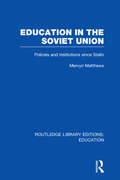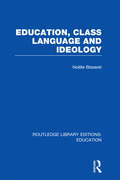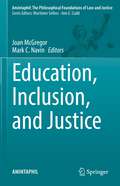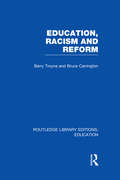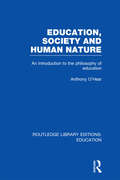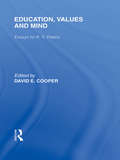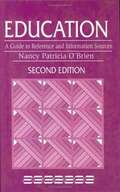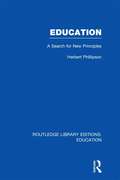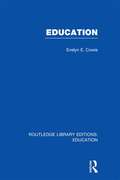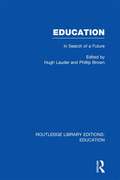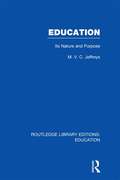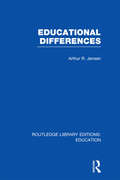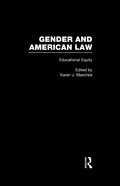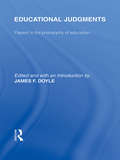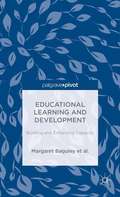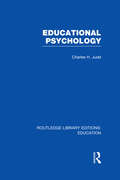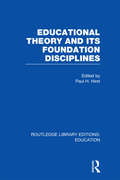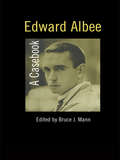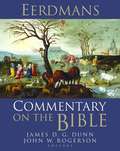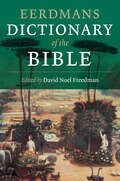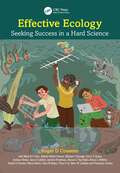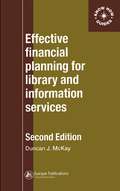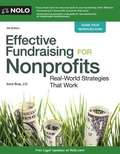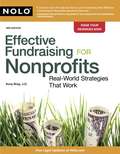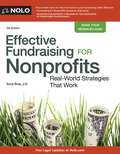- Table View
- List View
Education in the Soviet Union: Policies and Institutions Since Stalin (Routledge Library Editions: Education)
by Mervyn MatthewsThis book provides a comprehensive survey of the successes and failures of education and training in the Khrushchev and Breshnev years. The author gives an objective assessment of the accessibility of the main types of institution, of the contents of courses and of Soviet attempts to marry the functioning of their education system to their perceived economic and social needs. In addition the book has many useful and original features: For ease of analysis it summarises in diagram form complex statistics which are not usually brought together for so long a time period. It provides a systematic account of educational legislation; Matthews’ comparison of series of official decrees will allow subtle shifts in government policy to be accurately charted. Particular attention is also paid to a number of issues that are often neglected: the employment problems of school and college graduates; the role and professional status of teachers; political control and militarisation in schools; the close detail of higher education curricula; and the rate of student failure. Of special value is the chapter on those educational institutions which are often omitted from Western studies and which are hardly recognised as such in most official Soviet sources.
Education, Class Language and Ideology (Routledge Library Editions: Education)
by Noelle BisseretThis book presents an analysis of the ‘essentialist ideology’, which is inherent to class-based societies. The author argues that essentialist ideology is efficient through its unconscious component and is imposed on everyone. It guides school selection and imposes on each class a language specific in its reference to concrete domination relations. It even unbalances the scientific objectivity of researchers in the social sciences, not only among those who abide by the theory of natural aptitudes, but also among its sharpest critics, such as Basil Bernstein, Pierre Bourdieu and J C Passeron, whose work is considered in this book.
Education, Inclusion, and Justice (AMINTAPHIL: The Philosophical Foundations of Law and Justice #11)
by Mark C. Navin Joan McGregorThis book approaches education as a vital human good, both because it fosters the development of intellectual, moral and civic virtues, and because it promotes the development of valuable skills for work and for life. Accordingly, debates on justice, democracy, equality and inclusion often focus on questions concerning the kind of education people should receive, how scarce educational goods should be distributed, and the role of education in responding to historical and ongoing injustices. This volume collects 16 new essays that explore these pressing ethical, political and legal issues.
Education, Racism and Reform (Routledge Library Editions: Education)
by Barry Troyna Bruce CarringtonIn this introductory text the authors look closely at widely held assumptions about ‘race’ and schooling in Britain, and evaluate the role of the school in a multi-ethnic society. Focusing on contemporary issues and concerns, they consider such controversial questions as: Is the education system rigged against black pupils? Is ‘tolerance’ really a characteristic of the British? The volume provides a detailed analysis of the Education Reform Act (1988) and the debate surrounding the National Curriculum, and asks whether these new initiatives do truly open the doors of opportunity for all children.
Education, Society and Human Nature: An Introduction to the Philosophy of Education (Routledge Library Editions: Education)
by Anthony O'HearIntended primarily for education students this book provides an introduction to the philosophy of education that tackles educational problems and at the same time relates them to the mainstream of philosophical analysis. Among the educational topics the book discusses are the aims of education, the two cultures debate, moral education, equality as an ideal and academic elitism. It examines the limitations of a purely technological education, and suggests the shape of a balanced curriculum. It critically analyses important educational theses in the work of Rousseau, Dewey, R S Peters, P H Hirst, F R Leavis, Ronald Dworkin and G H Bantock, among many others, and considers the philosophical copics of relativism, the nature of knowledge, the basis of moral choice, the value of democracy and the status of religious claims.
Education, Values and Mind (International Library of the Philosophy of Education Volume 6): Essays for R. S. Peters
by David CooperR. S. Peters has not only been the major philosopher of education in Britain during second half of the twentieth century, but by common consent, he has transformed the subject and brought it into the mainstream of contemporary philosophy. The ten essays in this book attest to his influence whether by critical examination of his ideas or by original treatment of topics in which has has inspired a new interest.
Education: A Guide to Reference and Information Sources (2nd edition)
by Nancy Patricia O'BrienFocusing on English-language publications of the last decade, this guide identifies and describes key reference and information sources in the field of education today.
Education: A Search For New Principles (Routledge Library Editions: Education)
by Herbert PhillipsonContributing to early debates on nature versus nurture, schools and the social environment, town planning and a free comprehensive education, the author discusses key educational issues against the background of a distintegrating Europe in the midst of war.
Education: Examining the Evidence (Routledge Library Editions: Education)
by Evelyn E CowieThis volume contains both text and contemporary document which together look at the history of education from the French Revolution to the late twentieth century. The connection between text and documents is closely preserved so that the volume both explains and illustrates the important issues and problems and at the same time poses questions for students to consider or follow up.
Education: In Search of A Future (Routledge Library Editions: Education)
by Phillip Brown Hugh LauderWhat unites the contributors to this book is an opposition to Thatcherite policies on education and an agreement upon the need for the development of democracy in education. This volume highlights the importance of an area of neglected theoretical and practical concern: the development of a critique of the philosophy and policies of the new Right, and of credible alternative policies.
Education: Its Nature and Purpose (Routledge Library Editions: Education)
by M VC JeffreysThis book discusses the very nature and purpose of education and provides a foundation upon which more specialized studies in the psychology, history and sociology of education can be based. The book therefore surveys the main problems of human life – the relation of the individual and society, freedom and authority, continuity and change (i.e.growth), and underlying them all, the paradox that aspiration and frustration are continually linked in human experience. The educational implications of these various problems are considered in such a way that the methods as well as the aims of education are discussed.
Educational Differences (Routledge Library Editions: Education)
by Arthur JensenAmong particular issues discussed in this book are the problems of the cultural disadvantaged, the problems of devising psychological tests which are not biased towards any particular culture, the problems of minority groups of children in education and the relationship between heritability and teachability.
Educational Equity (Gender and American Law: The Impact of the Law on the Lives of Women)
by Karen J. MaschkeMultidisciplinary focus Surveying many disciplines, this anthology brings together an outstanding selection of scholarly articles that examine the profound impact of law on the lives of women in the United States. The themes addressed include the historical, political, and social contexts of legal issues that have affected women's struggles to obtain equal treatment under the law. The articles are drawn from journals in law, political science, history, women's studies, philosophy, and education and represent some of the most interesting writing on the subject. The law in theory and practice Many of the articles bring race, social, and economic factors into their analyses, observing, for example, that black women, poor women, and single mothers are treated by the wielders of the power of the law differently than middle class white women. Other topics covered include the evolution of women's legal status, reproduction rights, sexuality and family issues, equal employment and educational opportunities, domestic violence, pornography and sexual exploitation, hate speech, and feminist legal thought. A valuable research and classroom aid, this series provides in-depth coverage of specific legal issues and takes into account the major legal changes and policies that have had an impact on the lives of American women.
Educational Judgments (International Library of the Philosophy of Education Volume 9): Papers in the Philosophy of Education
by James F. DoyleThe topics covered in this volume, originally published in 1973, include the need for a more adequate concept or definition of education, the issue of whether indoctrination is compatible with education, particularly with moral education, and the processes of judging the merits of different approaches to aesthetic education. Two contributors present complementary analyses of the relations between freedom as a characteristic of institutions and the process of learning to be a free man. There is discussion of the neglected subject of rights and duties in education, with special emphasis on the question of a universal right to education. The volume concludes with papers on the relevance of philosophy to the practical judgments of educators and to education as a field of study.
Educational Learning and Development: Building and Enhancing Capacity
by Andy Davies Margaret Baguley Patrick Alan Danaher Linda De George-Walker Janice K. Jones Karl J. Matthews Warren Midgley Catherine H. ArdenThrough ten research projects, this book explores the topic of educational learning and development in order to examine issues that are impacting, either positively or negatively, on current research in this area. The authors explore the capacity building potential of the projects and what factors impacted on or assisted their development.
Educational Psychology (Routledge Library Editions: Education)
by Charles H JuddNo influence has more profoundly affected educational thought and practice during the late 19th and early 20th centuries than the science of psychology. This volume discusses the major differences between education prior to the influence of educational psychology and then examines the impact this had on the education of children and the experience of teachers.
Educational Theory and Its Foundation Disciplines (Routledge Library Editions: Education)
by Paul H. HirstAt the time this book was first published the disciplines of philosophy of education, educational psychology, sociology of education and the history of education had developed rapidly. The papers in this volume outline the developments that took place. The first paper analyses the nature of a theory concerned with determining practice and the place of academic disciplines within that. What emerges is the crucial role of these disciplines, but also the need to develop much more adequately a domain of practical principles, assessed and critically reformulated in the light of those disciplines. The following papers are concerned with the contributions four of those disciplines are now making.
Edward Albee: A Casebook (Casebooks on Modern Dramatists #Vol. 29)
by Bruce MannFrom the "angry young man" who wrote Who's Afraid of Virginia Woolf in 1962, determined to expose the emptiness of American experience to Tiny Alice which reveals his indebtedness to Samuel Beckett and Eugene Ionesco's Theatre of the Absurd, Edward Albee's varied work makes it difficult to label him precisely. Bruce Mann and his contributors approach Albee as an innovator in theatrical form, filling a critical gap in theatrical scholarship.
Eerdmans Commentary on the Bible
by James D. G. Dunn and John W. RogersonNo one familiar with the Bible needs to be told that it is a truly remarkable work. But it takes help to understand this ancient collection of diverse forms of literature written by different people across many centuries. The Eerdmans Commentary on the Bible (ECB) is the finest single-volume Bible handbook available. Written by world-class Bible scholars, the ECB encapsulates in nontechnical language the best of modern scholarship on the sixty-six biblical books plus the Apocrypha. The only one-volume Bible commentary to cover all the texts (even including 1 Enoch) regarded by one or more Christian churches as canonical, the ECB provides reader-friendly treatments and succinct summaries of each section of the text that will be valuable to scholars, students, and general readers alike. The primary objective of this work is to clarify the meaning of each section of the Bible. Rather than attempting a verse-by-verse analysis (virtually impossible in a one-volume work), the ECB focuses on principal units of meaning—narrative, parable, prophetic oracle, section of argument, and so on—highlighting their interconnectedness with the rest of the biblical text. The volume also addresses and answers major issues—including the range of possible interpretations—and refers readers to the best fuller discussions. Beyond providing reliable, informative commentary, this hefty volume also includes thirteen introductory and context-setting articles that do justice to the biblical documents both as historical sources and as scriptures. The sixty-seven contributors to the ECB come from a wide variety of backgrounds and are acknowledged leaders in the field of biblical studies. Their contributions stand out either for their fresh interpretations of the evidence, or for their way of asking new questions of the text, or for their new angles of approach. While the translation of choice is the New Revised Standard Version, many of the contributors offer their own vivid translations of the original Hebrew or Greek. Cutting-edge, comprehensive, and ecumenical, the ECB is both a fitting climax to the rich body of interconfessional work undertaken in the latter part of the twentieth century and a worthy launching pad for biblical study in the twenty-first.Special Features of the ECBThe only one-volume commentary to cover all the texts (including the Apocrypha and 1 Enoch) regarded by one or more Christian churches as canonicalThirteen major essays that introduce each section of Scripture and its studyEncapsulates in nontechnical language the best of modern scholarshipIncludes superb bibliographies and an extensive subject indexWritten by sixty-seven first-rate Bible scholarsDesigned for use by scholars, students, pastors, and general readers
Eerdmans Dictionary of the Bible
by David Noel FreedmanThe Eerdmans Dictionary of the Bible gathers nearly 5,000 alphabetically ordered articles that thoroughly yet clearly explain all the books, persons, places, and significant terms found in the Bible. The Dictionary also explores the background of each biblical book and related writings and discusses cultural, natural, geographical, and literary phenomena--matters that Bible students at all levels may encounter in reading or discussion. Nearly 600 first-rate Bible authorities have contributed to the Eerdmans Dictionary of the Bible. Intended as a tool for practical Bible use, this illustrated dictionary reflects recent archaeological discoveries and the breadth of current biblical scholarship, including insights from critical analysis of literary, historical, sociological, and other methodological issues. The editorial team has also incorporated articles that explore and interpret important focuses of biblical theology, text and transmission, Near Eastern archaeology, extrabiblical writings, and pertinent ecclesiastical traditions--all of which help make the Eerdmans Dictionary of the Bible the most comprehensive and up-to-date one-volume Bible dictionary on the market today.
Effective Ecology: Seeking Success in a Hard Science
by Roger D. CousensEcology is one of the most challenging of sciences, with unambiguous knowledge much harder to achieve than it might seem. But it is also one of the most important sciences for the future health of our planet. It is vital that our efforts are as effective as possible at achieving our desired outcomes. This book is intended to help individual ecologists to develop a better vision for their ecology – and the way they can best contribute to science. The central premise is that to advance ecology effectively as a discipline, ecologists need to be able to establish conclusive answers to key questions rather than merely proposing plausible explanations for mundane observations. Ecologists need clear and honest understanding of how we have come to do things the way we do them now, the limitations of our approaches, our goals for the future and how we may need to change our approaches if we are to maintain or enhance our relevance and credibility. Readers are taken through examples to show what a critical appraisal can reveal and how this approach can benefit ecology if it is applied more routinely.Ecological systems are notable for their complexity and their variability. Ecology is, as indicated by the title of this book, a truly difficult science. Ecologists have achieved a great deal, but they can do better. This book aims to encourage early-career researchers to be realistic about their expectations: to question everything, not to take everything for granted, and to make up their own minds.
Effective Financial Planning for Library and Information Services
by Duncan McKay Duncan MckayThis title is a concise guide to financial planning, with definitions of financial terms and the key processes involved, which also provides tips on how to present your budget most effectively to secure funding. As pressures of business increasingly affect all information functions, it has become ever more important to be able to justify the costs involved in running any form of information function. This second edition covers budgetary implications related to developments in information source provision.
Effective Fundraising for Nonprofits
by Ilona BrayGetting tax exempt status for your nonprofit organization is just the first step toward succeeding in your mission ultimately, your nonprofit's effectiveness depends entirely on your ability to raise money. Effective Fundraising for Nonprofits will show you how. Featuring advice and stories from over 40 experienced fundraisers, foundation staffers, journalists, and more, this edition of Effective Fundraising for Nonprofits offers strategies for raising donations from individuals, companies, and institutions, and covers the tools and staff you'll need to get the job done. Find out how to: -work with individual donors -analyze the donor base -plan special events -solicit grants from foundations and corporations -get media coverage -use the Web to further fundraising goals -start a side business to raise funds Best of all, Effective Fundraising for Nonprofits contains expert advice written in plain English, cutting out the jargon and "consultant speak" that's all too common in many nonprofit books. The new edition covers the latest wisdom on online fundraising, including using social networking for fundraising and tips on dealing with the down economy. And you can read up on latest studies on who gives the most and why and the latest tips for "greening" your nonprofit's special events. Plus, you'll get the latest tax figures, guidelines for the new IRS Form 990, and updated resource recommendations and contact information.
Effective Fundraising for Nonprofits
by Ilona Bray J.D.Getting tax-exempt status for your nonprofit organization is just the first step -- whether its mission will succeed depends entirely on your ability to raise money. Fortunately, Effective Fundraising for Nonprofits will show you how. Featuring advice and stories from over 40 experienced fundraisers, foundation staffers, journalists and more, the 2nd edition of Effective Fundraising for Nonprofits explains how to: work with individual donors plan special events solicit grants from foundations and corporations get media coverage use the Web to further fundraising goals start a side business to raise funds and much more The 3rd edition is updated to reflect the latest studies on who gives the most and why. It also contains new tax figures, the new IRS Form 990, updated resource recommendations and contact information and offers tips for "greening" one's special events.
Effective Fundraising for Nonprofits: Real-World Strategies That Work
by Ilona BrayGetting tax-exempt status for your nonprofit organization is just the first step toward succeeding in your mission -- ultimately, your nonprofit's effectiveness depends entirely on your ability to raise money. Effective Fundraising for Nonprofits will show you how. Featuring advice and stories from over 40 experienced fundraisers, foundation staffers, journalists, and more, this edition of Effective Fundraising for Nonprofits offers strategies for raising donations from individuals, companies, and institutions, and covers the tools and staff you'll need to get the job done. Find out how to: work with individual donors analyze the donor base plan special events solicit grants from foundations and corporations get media coverage use the Web to further fundraising goals start a side business to raise funds Best of all, Effective Fundraising for Nonprofits contains expert advice written in plain English, cutting out the jargon and "consultant speak" that's all too common in many nonprofit books. This easy-to-read book combines the author's legal and fundraising experience with advice and stories from over 50 experienced fundraisers. Offers practical guidance on all the forms of fundraising that a new or small to mid-size nonprofit will need, including working with individual donors, planning special events, soliciting grants from foundations and corporations, getting media coverage, using the Web and social media, and much more. Includes handy worksheets and sample letters.
